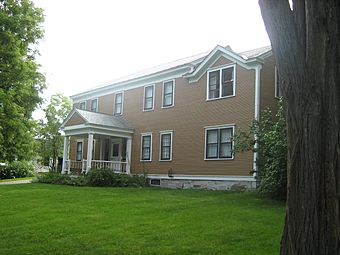Rokeby (Ferrisburg, Vermont) facts for kids
|
Rokeby Museum
|
|
 |
|
| Location | 4334 US 7, Ferrisburgh, Vermont |
|---|---|
| Area | 85 acres (34 ha) |
| Built | c. 1780s |
| NRHP reference No. | 74000201 |
Quick facts for kids Significant dates |
|
| Added to NRHP | June 20, 1974 |
| Designated NHL | December 9, 1997 |
The Rokeby Museum is a special old farm and museum located in Ferrisburgh, Vermont. It sits on a large property, about 90 acres, which is like 68 football fields! Here you can explore an old farmstead from the 1780s. There are eight farm buildings with cool exhibits inside. You can also walk on hiking trails that cover more than 50 acres of the land.
Rokeby Museum is open every year from mid-May to mid-October. It became a National Historic Landmark in 1997. This is because of a brave man named Rowland T. Robinson. He was a Quaker and strongly against slavery. He helped people escape slavery by hiding them at Rokeby. This was part of a secret network called the Underground Railroad. Rowland Robinson's letters are very important. They tell us a lot about how abolitionists worked and how the Underground Railroad helped people find freedom.
Contents
Discover Rokeby Museum's History
Rokeby Museum is on the east side of United States Route 7 in Ferrisburgh. The main part of the museum is a group of buildings. These include the main house, which was built in the 1780s, and other farm buildings. You can see a smokehouse, a hen house, a creamery, and a tool shed. There are also old foundations from a barn and a school.
The main house is a two-story wooden building. It has an older, smaller house attached to its back. This smaller part was built in the 1780s by the Dakin family. They were the first to clear the land here. In 1793, a Quaker named Thomas Rowland Robinson bought the property. He came from Newport, Rhode Island.
The Robinson Family's Secret Mission
For almost 200 years, the Robinson family lived in this house. They were farmers, millers, and also very important abolitionists. This means they worked to end slavery. In the 1830s and 1840s, Rowland T. Robinson and his wife, Rachel Gilpin Robinson, used Rokeby as a safe place. It was a stop on the Underground Railroad.
The Robinsons were devoted Quakers. Their letters mention the names of people who had escaped slavery. These letters give us a rare look into how abolitionists helped people. They also show how the Underground Railroad secretly operated.
Famous Family Members
Rowland Robinson, a son of Rowland T. and Rachel, grew up at Rokeby. He became a well-known author. His daughter, Rachael Robinson Elmer, also lived at Rokeby. She became a celebrated artist.
Rokeby was first listed on the National Register of Historic Places in 1974. It was then named a National Historic Landmark in 1997. This shows how important the farm and its history are to our country.
People Who Lived at Rokeby
- Delia Webster: She was an abolitionist and a teacher.
- Rachael Robinson Elmer: She was a talented painter.
- Rowland Robinson: He was a famous author.
More Places to Explore
- List of National Historic Landmarks in Vermont
- List of the oldest buildings in Vermont
- National Register of Historic Places listings in Addison County, Vermont
 | Anna J. Cooper |
 | Mary McLeod Bethune |
 | Lillie Mae Bradford |



